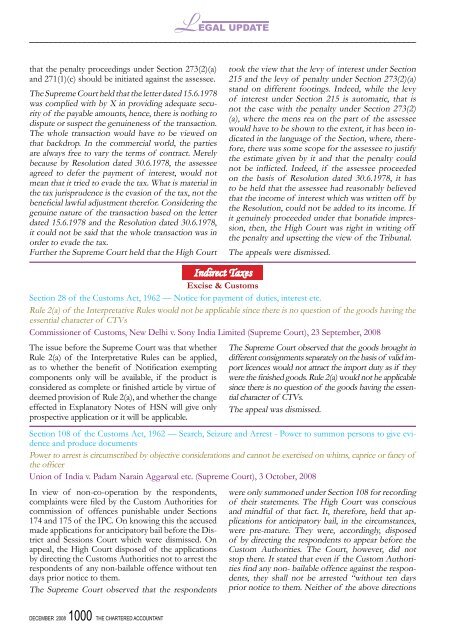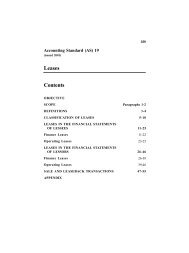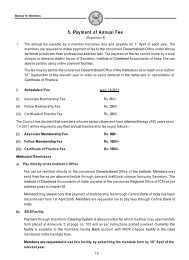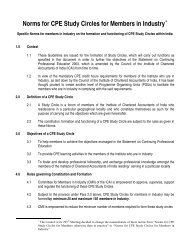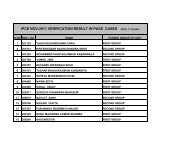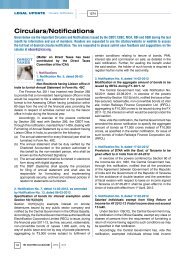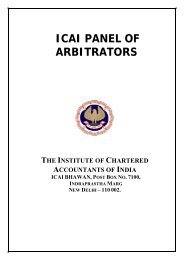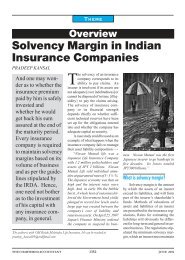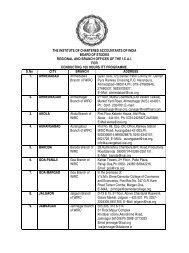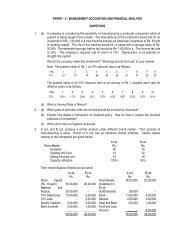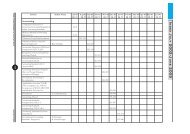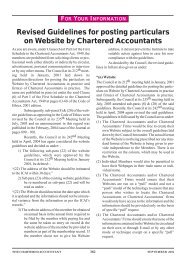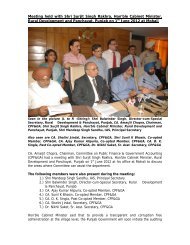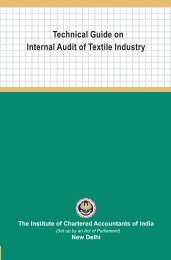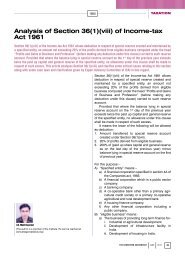The Chartered Accountant
The Chartered Accountant
The Chartered Accountant
Create successful ePaper yourself
Turn your PDF publications into a flip-book with our unique Google optimized e-Paper software.
that the penalty proceedings under Section 273(2)(a)<br />
and 271(1)(c) should be initiated against the assessee.<br />
<strong>The</strong> Supreme Court held that the letter dated 15.6.1978<br />
was complied with by X in providing adequate security<br />
of the payable amounts, hence, there is nothing to<br />
dispute or suspect the genuineness of the transaction.<br />
<strong>The</strong> whole transaction would have to be viewed on<br />
that backdrop. In the commercial world, the parties<br />
are always free to vary the terms of contract. Merely<br />
because by Resolution dated 30.6.1978, the assessee<br />
agreed to defer the payment of interest, would not<br />
mean that it tried to evade the tax. What is material in<br />
the tax jurisprudence is the evasion of the tax, not the<br />
beneficial lawful adjustment therefor. Considering the<br />
genuine nature of the transaction based on the letter<br />
dated 15.6.1978 and the Resolution dated 30.6.1978,<br />
it could not be said that the whole transaction was in<br />
order to evade the tax.<br />
Further the Supreme Court held that the High Court<br />
DECEMBER 2008 1000 THE CHARTERED ACCOUNTANT<br />
LEGAL UPDATE<br />
took the view that the levy of interest under Section<br />
215 and the levy of penalty under Section 273(2)(a)<br />
stand on different footings. Indeed, while the levy<br />
of interest under Section 215 is automatic, that is<br />
not the case with the penalty under Section 273(2)<br />
(a), where the mens rea on the part of the assessee<br />
would have to be shown to the extent, it has been indicated<br />
in the language of the Section, where, therefore,<br />
there was some scope for the assessee to justify<br />
the estimate given by it and that the penalty could<br />
not be inflicted. Indeed, if the assessee proceeded<br />
on the basis of Resolution dated 30.6.1978, it has<br />
to be held that the assessee had reasonably believed<br />
that the income of interest which was written off by<br />
the Resolution, could not be added to its income. If<br />
it genuinely proceeded under that bonafide impression,<br />
then, the High Court was right in writing off<br />
the penalty and upsetting the view of the Tribunal.<br />
<strong>The</strong> appeals were dismissed.<br />
Indirect Taxes<br />
Excise & Customs<br />
Section 28 of the Customs Act, 1962 — Notice for payment of duties, interest etc.<br />
Rule 2(a) of the Interpretative Rules would not be applicable since there is no question of the goods having the<br />
essential character of CTVs<br />
Commissioner of Customs, New Delhi v. Sony India Limited (Supreme Court), 23 September, 2008<br />
<strong>The</strong> issue before the Supreme Court was that whether<br />
Rule 2(a) of the Interpretative Rules can be applied,<br />
as to whether the benefit of Notification exempting<br />
components only will be available, if the product is<br />
considered as complete or finished article by virtue of<br />
deemed provision of Rule 2(a), and whether the change<br />
effected in Explanatory Notes of HSN will give only<br />
prospective application or it will be applicable.<br />
<strong>The</strong> Supreme Court observed that the goods brought in<br />
different consignments separately on the basis of valid import<br />
licences would not attract the import duty as if they<br />
were the finished goods. Rule 2(a) would not be applicable<br />
since there is no question of the goods having the essential<br />
character of CTVs.<br />
<strong>The</strong> appeal was dismissed.<br />
Section 108 of the Customs Act, 1962 — Search, Seizure and Arrest - Power to summon persons to give evidence<br />
and produce documents<br />
Power to arrest is circumscribed by objective considerations and cannot be exercised on whims, caprice or fancy of<br />
the officer<br />
Union of India v. Padam Narain Aggarwal etc. (Supreme Court), 3 October, 2008<br />
In view of non-co-operation by the respondents,<br />
complaints were filed by the Custom Authorities for<br />
commission of offences punishable under Sections<br />
174 and 175 of the IPC. On knowing this the accused<br />
made applications for anticipatory bail before the District<br />
and Sessions Court which were dismissed. On<br />
appeal, the High Court disposed of the applications<br />
by directing the Customs Authorities not to arrest the<br />
respondents of any non-bailable offence without ten<br />
days prior notice to them.<br />
<strong>The</strong> Supreme Court observed that the respondents<br />
were only summoned under Section 108 for recording<br />
of their statements. <strong>The</strong> High Court was conscious<br />
and mindful of that fact. It, therefore, held that applications<br />
for anticipatory bail, in the circumstances,<br />
were pre-mature. <strong>The</strong>y were, accordingly, disposed<br />
of by directing the respondents to appear before the<br />
Custom Authorities. <strong>The</strong> Court, however, did not<br />
stop there. It stated that even if the Custom Authorities<br />
find any non- bailable offence against the respondents,<br />
they shall not be arrested “without ten days<br />
prior notice to them. Neither of the above directions


